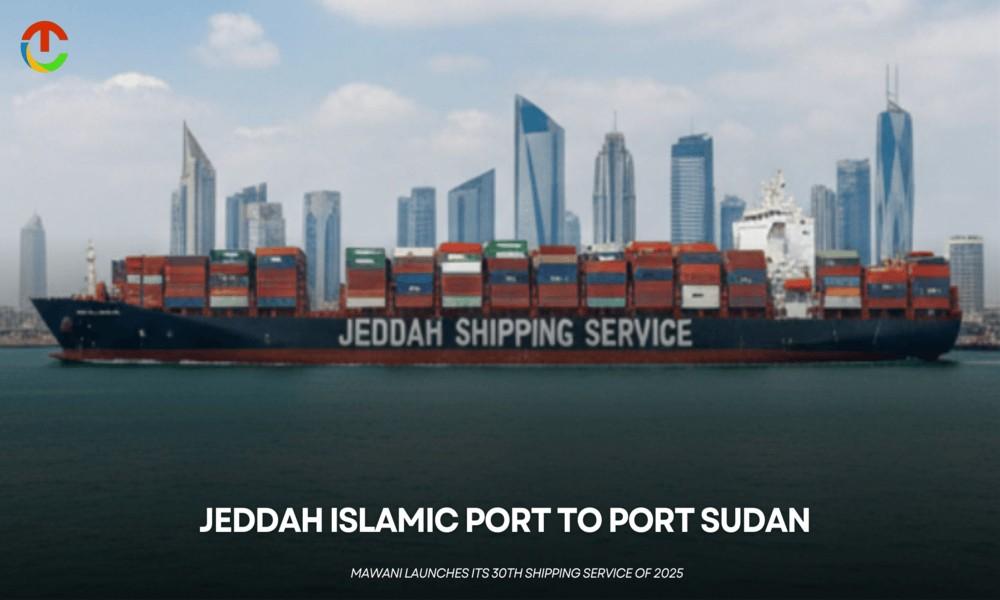Key Highlights:
- Mawani launches its 30th shipping service of 2025
- New route connects Jeddah Islamic Port with Port Sudan
- Boosts Saudi Arabia’s maritime trade strategy
- Strengthens Red Sea connectivity and regional logistics hub role
- Supports Saudi Vision 2030 diversification goals
The Jeddah shipping service has received a major boost as the Saudi Ports Authority, Mawani, announced the launch of a new maritime route linking Jeddah Islamic Port to Port Sudan. This marks the 30th shipping service introduced in 2025, underlining Saudi Arabia’s growing role as a global logistics powerhouse. The new connection is expected to enhance trade flows across the Red Sea corridor, reinforcing Jeddah’s position as one of the region’s most critical maritime gateways.
In this long-form report, we explore the significance of this expansion, its impact on trade, regional economic growth, and how it aligns with Saudi Arabia’s Vision 2030 strategy.
Jeddah Islamic Port: The Beating Heart of Saudi Maritime Trade
Located strategically on the Red Sea, Jeddah Islamic Port is not only the largest seaport in the Kingdom but also a vital node in international trade networks. Handling more than 60% of Saudi Arabia’s imports, the port serves as a bridge between Asia, Africa, and Europe.
The launch of the new shipping service to Port Sudan further strengthens its connectivity, opening new opportunities for bilateral trade and supporting regional supply chains.
Mawani’s Role in Saudi Arabia’s Shipping Growth
Mawani, the official Saudi Ports Authority, has been driving initiatives to transform the Kingdom into a leading logistics hub. In 2025 alone, the authority has already launched 30 new shipping services, a remarkable achievement that reflects Saudi Arabia’s determination to diversify its economy and reduce dependence on oil exports.
By introducing this Jeddah shipping service, Mawani demonstrates its commitment to:
-
Expanding international trade networks
-
Enhancing Red Sea competitiveness
-
Supporting logistics and supply chain resilience
-
Contributing to Vision 2030 economic reforms
Strengthening Ties Between Saudi Arabia and Sudan
The launch of the Jeddah-Port Sudan shipping route is more than just an infrastructural upgrade; it represents a significant step in deepening economic and diplomatic relations between Saudi Arabia and Sudan.
-
Port Sudan serves as Sudan’s main maritime gateway, linking the country to global markets.
-
The route offers faster, more cost-effective shipping solutions for importers and exporters.
-
Enhanced connectivity encourages investment, job creation, and trade growth on both sides.
This development also provides Sudan with increased access to Saudi Arabia’s modern logistics infrastructure, thereby supporting Sudan’s economic integration with the broader Gulf and Middle East region.
The Red Sea: A Global Trade Lifeline
The Red Sea is one of the world’s busiest maritime corridors, carrying nearly 10% of global seaborne trade. With strategic chokepoints like Bab el-Mandeb and the Suez Canal, the region plays a critical role in connecting East and West.
By boosting Jeddah shipping services, Saudi Arabia is not only strengthening its national logistics capabilities but also positioning itself as a stabilizing force in global trade.
The new route to Port Sudan adds another layer of resilience to this vital corridor, ensuring trade continuity, reduced shipping costs, and stronger supply chain flexibility.
Economic Impact of the New Jeddah Shipping Service
The introduction of the new service is expected to bring significant economic benefits for both Saudi Arabia and Sudan.
For Saudi Arabia:
-
Enhances logistics hub reputation in the Middle East.
-
Increases trade volumes passing through Jeddah Islamic Port.
-
Boosts non-oil revenues, supporting Vision 2030.
-
Attracts international shipping lines and investors.
For Sudan:
-
Strengthens access to international markets.
-
Provides efficient import-export logistics.
-
Generates employment opportunities in logistics and trade.
-
Encourages foreign investments in port and maritime infrastructure.
Vision 2030 and Saudi Arabia’s Logistics Strategy
Saudi Arabia’s Vision 2030 sets out a clear roadmap to transform the Kingdom into a global trade and logistics hub. The plan emphasizes infrastructure modernization, digitalization, and international partnerships.
The new Jeddah shipping service fits perfectly within this framework by:
-
Expanding trade connectivity with Africa.
-
Reducing reliance on oil-based revenues.
-
Strengthening regional maritime dominance.
-
Promoting public-private partnerships in logistics.
Challenges and Opportunities Ahead
While the new route offers tremendous opportunities, there are also challenges to consider:
-
Geopolitical tensions in the Red Sea region could affect trade security.
-
Global shipping disruptions due to conflicts or climate events may test supply chain resilience.
-
Maintaining cost efficiency and service reliability is crucial to long-term success.
Looking these challenges, the outlook remains positive. With continuous investments, strategic partnerships, and cutting-edge logistics solutions, Jeddah Islamic Port is well-positioned to thrive.
Industry Reactions
Maritime experts and trade analysts have welcomed the announcement, calling it a significant milestone in Saudi Arabia’s logistics transformation. Shipping companies expect the Jeddah-Port Sudan service to attract a steady flow of cargo, particularly in sectors like construction materials, agricultural goods, and manufactured products.
Sudanese businesses have also expressed optimism, viewing this development as an opportunity to expand exports and gain reliable access to Gulf markets.
Future Outlook: Jeddah’s Expanding Maritime Role
With every new shipping service, Jeddah Islamic Port cements its status as a central player in the global logistics landscape. The addition of the Port Sudan route not only adds economic value but also strengthens Saudi Arabia’s geopolitical influence in the Red Sea.
As trade between Asia, Africa, and Europe continues to grow, Jeddah’s strategic position will ensure its role as a gateway for global commerce remains unshakable.
Conclusion
The launch of the new Jeddah shipping service to Port Sudan represents a powerful step forward in Saudi Arabia’s ambition to become a world-class logistics hub. It reinforces the Kingdom’s role in Red Sea trade, deepens bilateral relations with Sudan, and supports the long-term goals of Vision 2030.
With 30 new shipping services already launched in 2025, Mawani is proving that Saudi Arabia is not just participating in global trade, it is shaping its future.
Exclusive interview with Ahmed Ali Al Bazi Al Nuaimi





